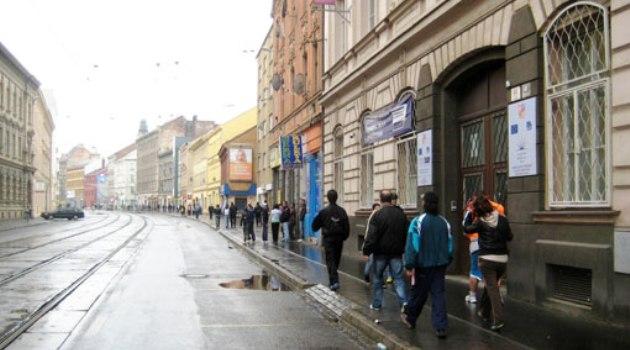Czech Republic: Protest march planned in Brno over eviction of 100+ mostly Romani families

More than 110 families with children living on Cejl Street in Brno, Czech Republic are in danger of eviction over the New Year. The “We Want To Live Indoors!” Solidarity Network (Chceme bydlet!) is therefore convening a protest march on Tuesday, 6 December, to express support for the at-risk families and draw attention to the practices of those speculating in housing.
The event will begin at 17:30 on Vlhká Street and will march through Moravské Square, where the Brno branch of the Dolfin R.E. firm is headquartered, ending at the New Town Hall. Jana Ustohalová of the South Moravian edition of Czech daily Mlada front DNES drew attention to the situation of the families at the beginning of November.
The leases held by the families, most of whom are Romani, end after the New Year and the city has no available substitute accommodation for them. Seven of the buildings in which the families at risk of eviction are now living were owned until recently by the Dolfin R.E. firm at Zábrdovice 1.
That company has not communicated with either the city or the tenants, according to information published by news server iDNES.cz. Moreover, the firm was bought by a new owner several weeks ago, the company Fidurock Private Equity Participations B. V, which has a difficult-to-trace ownership structure and is headquartered in Amsterdam.
According to information reported by news server Deník Referendum, the organizers of the demonstration are of the opinion that it will not be complicated for the new owner to evict the tenants. Most of the tenants have signed leases for just three months, although some do have open-ended leases – in any event, the occupants of the properties do not have enough information about the current situation and communicate only with the apartment building managers, as the new owners are refusing to meet with them.
According to the information published to date, some of the people could be evicted by year-end while others would be evicted by March. “The situation requires a strong civic reaction against this behavior, which, in the interest of personal profit, is endangering the basic security of tenure of these families with children. The needs of the people in those buildings are not being effectively defended by anybody,” explained Miriam Kanioková, a member of the Solidarity Network.
Deník Referendum quotes Kanioková as saying she is concerned most of these people will not find an equivalent housing alternative into which to move. Because the families are predominantly Romani, it was already very difficult in the first place for them to find the housing they now occupy under what are already disadvantageous conditions.
It is also a problem that such a big number of families are supposed to lose their housing at once. The crisis situation affects more than 100 children.
